初中英语状语从句课件(共46张PPT)
文档属性
| 名称 | 初中英语状语从句课件(共46张PPT) |  | |
| 格式 | ppt | ||
| 文件大小 | 443.5KB | ||
| 资源类型 | 教案 | ||
| 版本资源 | 人教新目标(Go for it)版 | ||
| 科目 | 英语 | ||
| 更新时间 | 2023-06-21 18:15:54 | ||
图片预览

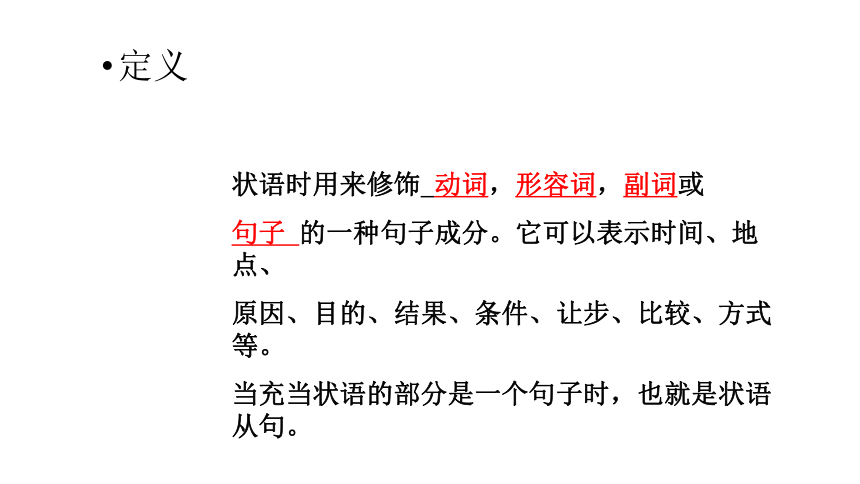
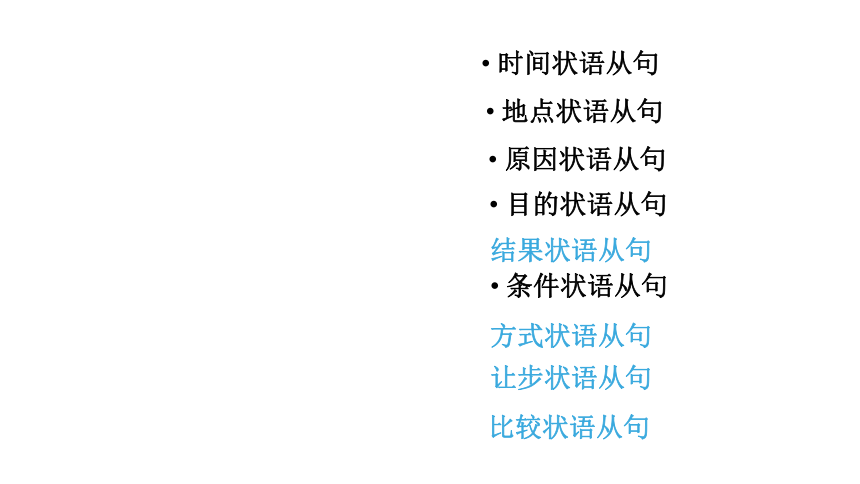
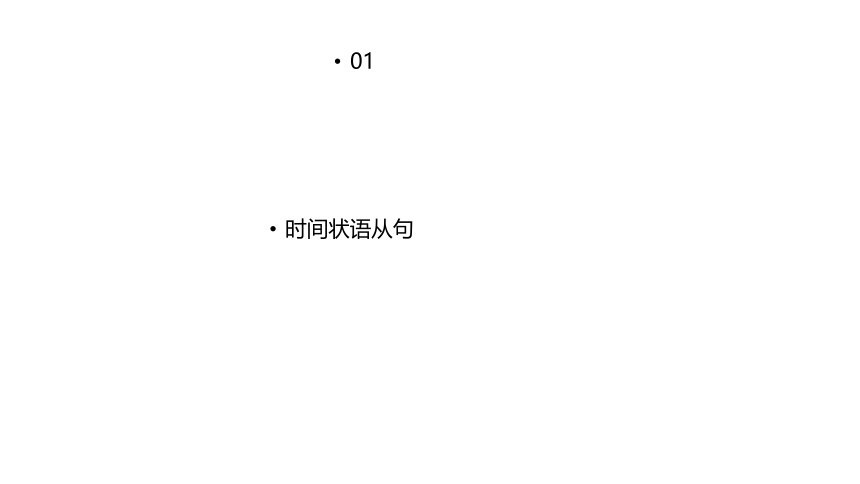
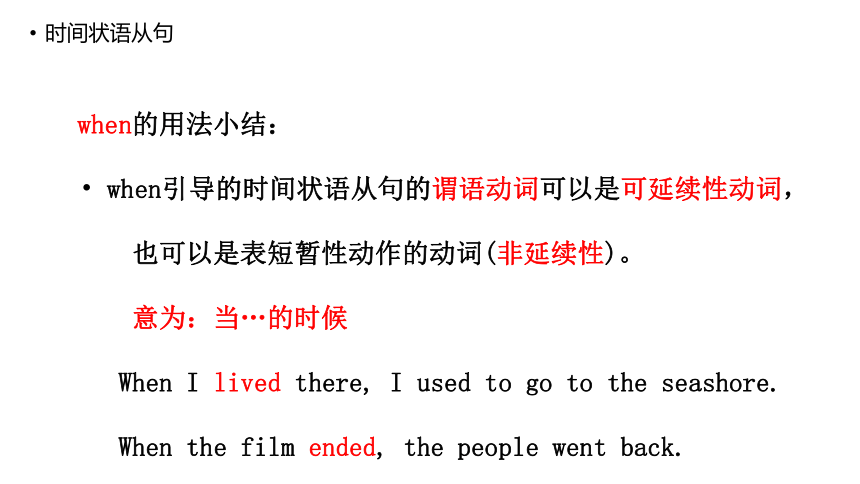
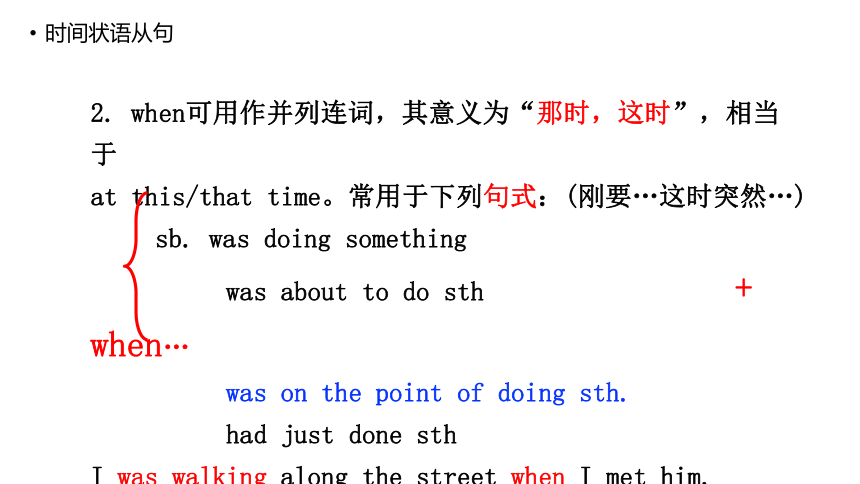
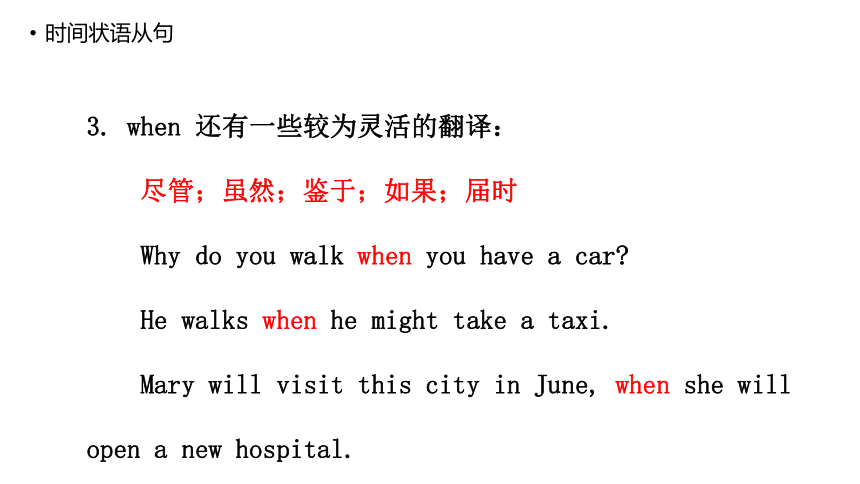
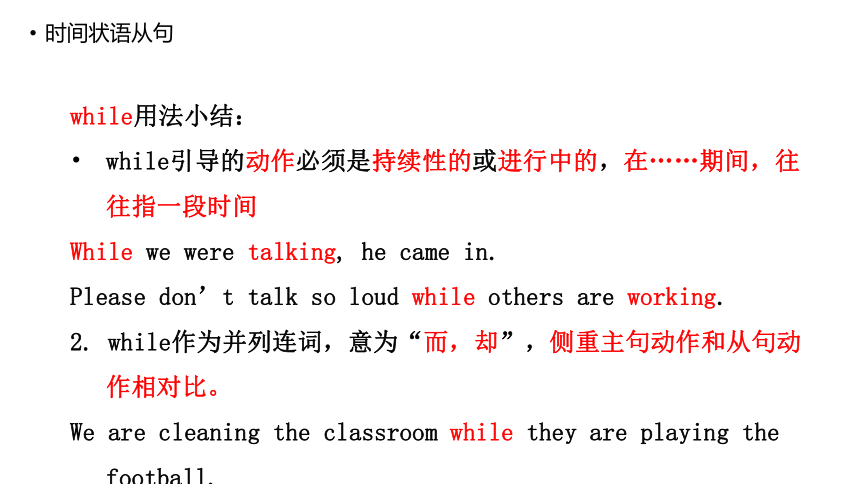
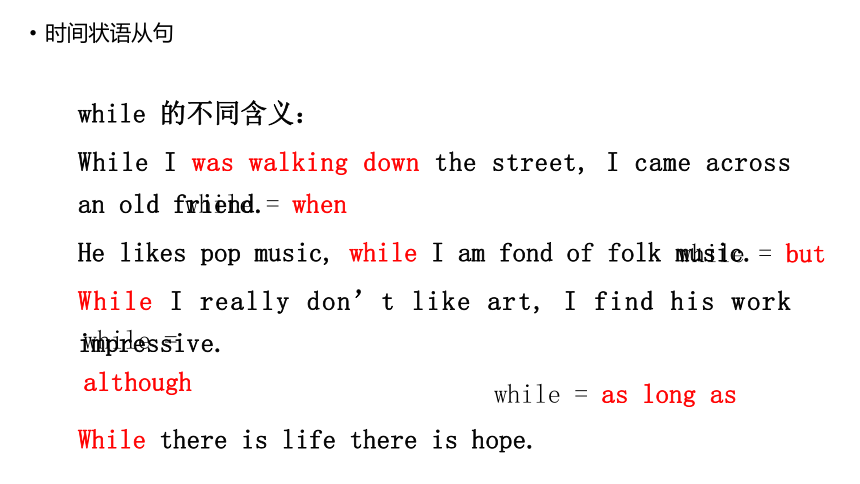
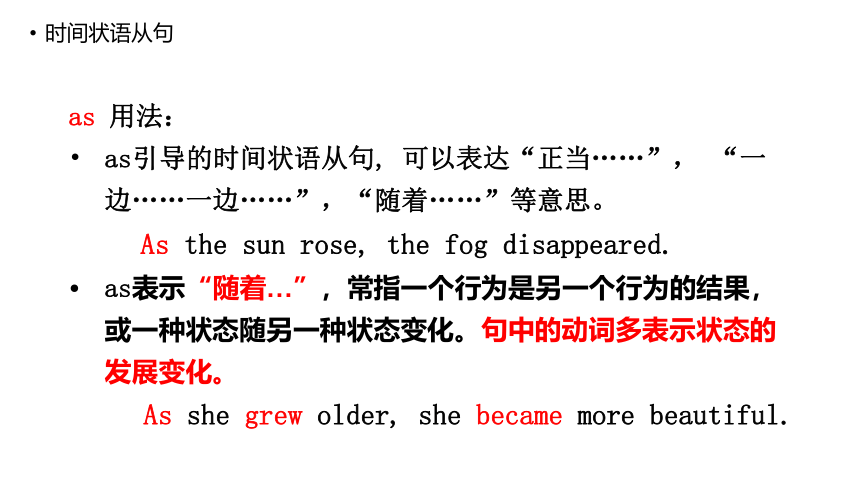
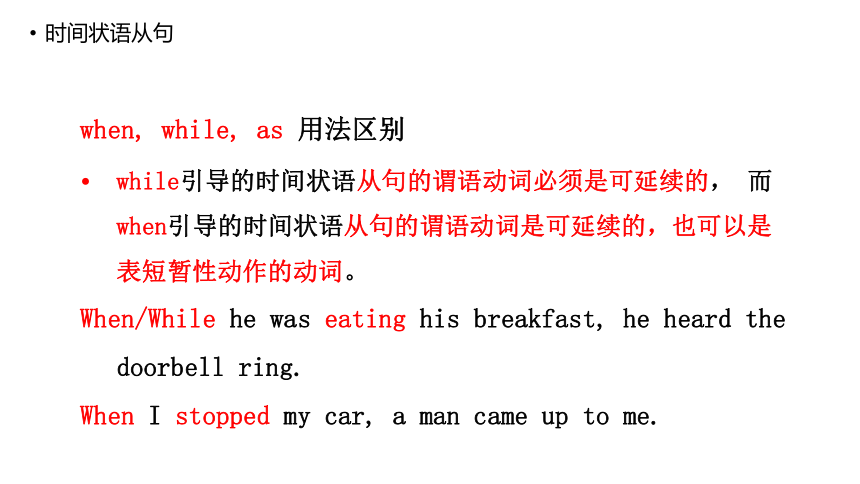
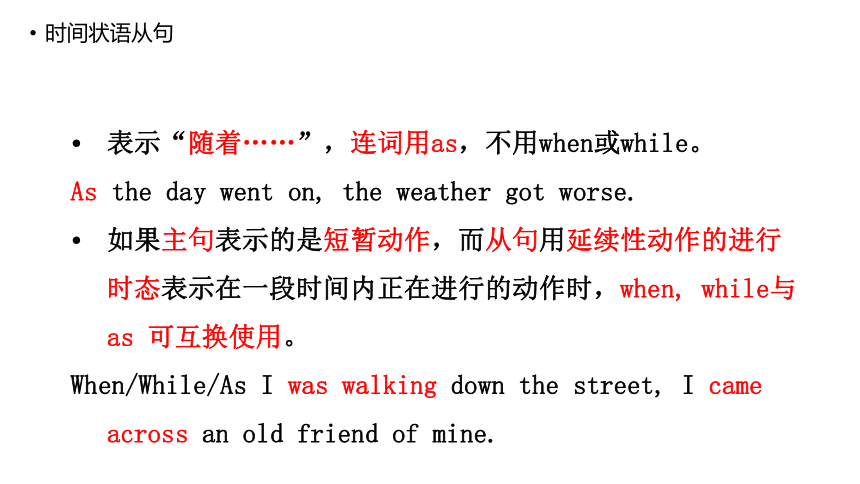
文档简介
(共46张PPT)
状语从句
定义
状语时用来修饰 动词,形容词,副词或
句子 的一种句子成分。它可以表示时间、地点、
原因、目的、结果、条件、让步、比较、方式等。
当充当状语的部分是一个句子时,也就是状语从句。
时间状语从句
地点状语从句
原因状语从句
目的状语从句
条件状语从句
状语从句
结果状语从句
让步状语从句
方式状语从句
比较状语从句
01
时间状语从句
时间状语从句
when的用法小结:
when引导的时间状语从句的谓语动词可以是可延续性动词,
也可以是表短暂性动作的动词(非延续性)。
意为:当…的时候
When I lived there, I used to go to the seashore.
When the film ended, the people went back.
时间状语从句
2. when可用作并列连词,其意义为“那时,这时”,相当于
at this/that time。常用于下列句式:(刚要…这时突然…)
sb. was doing something
was about to do sth + when…
was on the point of doing sth.
had just done sth
I was walking along the street when I met him.
I was about to fall asleep when my sister came in
时间状语从句
3. when 还有一些较为灵活的翻译:
尽管;虽然;鉴于;如果;届时
Why do you walk when you have a car
He walks when he might take a taxi.
Mary will visit this city in June, when she will open a new hospital.
时间状语从句
while用法小结:
while引导的动作必须是持续性的或进行中的,在……期间,往往指一段时间
While we were talking, he came in.
Please don’t talk so loud while others are working.
2. while作为并列连词,意为“而,却”,侧重主句动作和从句动作相对比。
We are cleaning the classroom while they are playing the football.
时间状语从句
while 的不同含义:
While I was walking down the street, I came across an old friend.
He likes pop music, while I am fond of folk music.
While I really don’t like art, I find his work impressive.
While there is life there is hope.
while = when
while = but
while = although
while = as long as
时间状语从句
as 用法:
as引导的时间状语从句, 可以表达“正当……”, “一 边……一边……”,“随着……”等意思。
As the sun rose, the fog disappeared.
as表示“随着…”,常指一个行为是另一个行为的结果,或一种状态随另一种状态变化。句中的动词多表示状态的发展变化。
As she grew older, she became more beautiful.
时间状语从句
when, while, as 用法区别
while引导的时间状语从句的谓语动词必须是可延续的, 而when引导的时间状语从句的谓语动词是可延续的,也可以是表短暂性动作的动词。
When/While he was eating his breakfast, he heard the doorbell ring.
When I stopped my car, a man came up to me.
时间状语从句
表示“随着……”,连词用as,不用when或while。
As the day went on, the weather got worse.
如果主句表示的是短暂动作,而从句用延续性动作的进行时态表示在一段时间内正在进行的动作时,when, while与as 可互换使用。
When/While/As I was walking down the street, I came across an old friend of mine.
时间状语从句
4. 从句动作发生在主句动作之前时,只能用when引导这个从句,不可用as或while。
When you have finished your work, you may have a rest.
When the children had gone to bed, she began to prepare her lessons.
时间状语从句
before引导的时间状语从句,常译为“在……之前”,
表示主句的动作发生在从句的动作之前。
We clean the classroom before we leave school every day.
句型 It will be/was+一段时间+before…“还要过多久才……”
句型 It will be/was not+一段时间+before…“不多久就……”
It will be two years before he leaves the country.
It wasn’t two years before he left the country.
时间状语从句
since引导的时间状语从句,常译为“自从……”,
主句常用现在完成时,从句常用一般过去时。
We haven’t seen each other since we parted.
常用句型:It is/It has been + 时间段 + since从句
“自从……有多长时间了 ”
It is/It has been six years since she graduated from the university.
翻译:他不吸烟有五年时间了。
时间状语从句
till, until 和 not…until… 的用法
until/till引导时间状语从句用于肯定句时,主句的动词是延续性动词,表示动作或状态一直持续到 until/till所表示的时间,意为“某动作一直延续到某时间点才停止”。
We waited till/until he came.
用于否定句时,主句谓语动词是非延续性动词,从句为肯定,意为“某动作直到某时间才开始”
He won’t go to bed till/until she returns.
时间状语从句
3.till不可以置于句首,而until可以。
Until you told me I had no idea of it.
4.not…until句型中的强调和倒装说法:
强调句:It was not until you told me that I had any idea of it.
倒装句(not…until…放句首时,主句要倒装):
Not until you told me did I have any idea of it.
时间状语从句
名词短语引导的时间状语从句:
the moment, the minute, the instant, the time, the hour, the
day, by the time, each time, every time, next time, any time等也可以引导时间状语从句。
Tom ran away the moment he saw his father coming along.
Every time he came, he would bring us a lot of flowers.
时间状语从句
no sooner… than…, hardly/ scarcely/ barely…when…引导
时间状语从句,从句用一般过去时,主句用过去完成时。
当no sooner, hardly/ scarcely/ barely位于句首时,主句要
用部分倒装。
I had no sooner reached home than it began to rain.
No sooner had I reached home than it began to rain.
时间状语从句
1. I was so familiar with him that I recognized his voice ______ I picked up the phone.
A. while B. after C. in case D. the minute
2. How long do you think it will take _______ our product becomes popular with the consumers
A. when B. until C. before D. since
D
C
时间状语从句
3. ______ the day went on, the weather got worse.
A. With B. Since C. As D. While
4. It will be a long time Peter his work.
A. since; has finished B. after; finishes
C. when; will finish D. before; finishes
C
D
时间状语从句
5. We were just calling you up you came in.
about; when B. on the point of; while
C. on the point of; when D. on the point of; as
6. Babies sleep 16 to 18 hours in every 24 hours, and they sleep less they grow older.
A. while B. as C. when D. after
C
B
02
地点状语从句
地点状语从句
地点状语从句用连接副词 where,wherever (在任何地方),everywhere(在每个地方) 引导。
We must camp where we can get water.
You can sit wherever you like.
She follows me everywhere I go.
03
原因状语从句
原因状语从句
原因状语从句表示主句中的某一动作或状态所发生的原因。
引导这种从句常用的连接词是:because, as, since, now that, for, 和 considering that(顾及到), seeing that (由于)
这七个连词都用于表示表示原因, 但在语气上一个比一个弱。
原因状语从句
because, since, as, for的区别:
1. because - 直接原因,非推断,语气最强,回答why的问题。
— Why did you go home early
— Because I was tired.
2. as和since – 通常放句首,一般用来表示明显的、已知的原因,译为“因为…;既然…; ”。
As he has no car, he can’t get there easily.
Since we have no money, we can’t buy it.
原因状语从句
because, since, as, for的区别:
3. for– 放句中,补充说明,常用于推断。
I decided to stop and have lunch, for I was feeling quite hungry.
原因状语从句
1. I danced in front of the people _________ I liked it.
2. ________ he was not well, I decided to go without him.
3. __________ everybody know about it, I don’t want to
talk any more.
4. He must be ill, ____ he is absent today.
because
As/Since
As/Since
for
04
目的状语从句
目的状语从句
so that既可以引导目的状语从句,又可引导结果状语从句。
引导目的状语从句时,一般用于主句后,有时可分开,so 有时可省略; 从句中要有情态动词
引导结果状语从句时,句中无情态动词
区分:Speak clearly so that they may understand you.
He got on the train late so that he found all the seats occupied.
目的状语从句
in order that: 用于正式文体中,从句可位于主句前或后。
和in order to 的区别:
in order to后面接动词,是简单句。
in order that后面加的是状语从句。
He came back early in order that he could attend the meeting.
In order to ensure success we must have a complete plan.
目的状语从句
I think that you had better get up earlier _______ you can get to class on time. A. in order B. so that C. such that D. that
_____ understand how the human body works, you need to have some knowledge of chemistry. A. In order to B. So as to C. In order that D. So that
I wrote it down _____ I forget. A. in case of B. in case C. as if D. in order that
B
A
B
05
结果状语从句
结果状语从句
so… that… (如此…以至于…), so 后面应用形容词或副词, 有时省略so只用that
Mike is so honest a man that we all believe him.
such…that… (如此…以至于…), 用法与so…that相同,但such后面应修饰名词。P.169 so, such结构
He made such an inspiring speech that everybody got so excited.
结果状语从句
so that(结果是,以致),引导结果状语从句时,句中无情态动词
He spoke clearly, so that everybody understood him.
结果状语从句
The teacher told us funny story we all laughed.
such a; that B. such, that C. so a, that D. so, that
2. Our PE teacher walks ____ we can't catch up with him.
A. so quick that B. too quickly that
C. so quickly that D. too quickly that 3. The workers work hard they don’t have a day off even on the weekend.
A. too; that B. such; that C. so; that D. as; that
A
C
C
06
条件状语从句
条件状语从句
条件状语从句表示主句中的某一动作或状态是在什么情况或条件下发生的。
条件状语从句中通常用一般现在时表示将来。
条件状语从句由从属连词引导:if, unless (除非), as / so long as (只要), on condition (只要), once ( 一旦), in case (假使) , providing / provided (that) 等。
条件状语从句
Unless:如果不, 除非 = if not
We can’t get there on time unless we book the earliest flight.
= We cannot get there on time if we don’t book the earliest flight.
条件状语从句
provided that: 如果,有时省略 that
The plane will be in good condition provided (that) it is taken care of carefully.
You can become a scientist provided (that) you are in good shape and you have got the proper education.
条件状语从句
on condition that:条件是…
He said that he would come to the meeting on condition that no one asked him to speak.
The mother promised to the son to buy him a toy airplane on condition that he passes his English test.
条件状语从句
条件句的时态,常见的有一下两种情况:
主将从现:书上P4
When I grow up, I will be a nurse and look after patients.
If I have time, I will go to the movies with him.
2. 如果主句是祈使句,那么从句通常要用一般现在时。(主祈从现)
If you want to have a talk, call me up.
条件状语从句
We will be able to get there on time, ____ our car doesn’t break down on the road.
A. as soon as B. as far as C. as long as D. as well as
2. In time of serious accidents, _____ we know some basic things about first aid, we can save lives.
A. whether B. until C. if D. unless
3. ____ you have tried it, you can’t imagine how pleasant it is.
A. Unless B. Because C. Although D. When
A
C
C
条件状语从句
4. If you _____ to the party, you’ll have a great time.
A. will go B. went C. go D. going
5. If Wang Fang _______me, _____me at once.
A. need; tell B. needs; telling C. need; telling D. needs; tell
6. I ____ her the answer if she ____me.
A. can tell; will ask B. will tell; will ask
C. would tell; ask D. will tell; asks
D
C
D
状语从句
定义
状语时用来修饰 动词,形容词,副词或
句子 的一种句子成分。它可以表示时间、地点、
原因、目的、结果、条件、让步、比较、方式等。
当充当状语的部分是一个句子时,也就是状语从句。
时间状语从句
地点状语从句
原因状语从句
目的状语从句
条件状语从句
状语从句
结果状语从句
让步状语从句
方式状语从句
比较状语从句
01
时间状语从句
时间状语从句
when的用法小结:
when引导的时间状语从句的谓语动词可以是可延续性动词,
也可以是表短暂性动作的动词(非延续性)。
意为:当…的时候
When I lived there, I used to go to the seashore.
When the film ended, the people went back.
时间状语从句
2. when可用作并列连词,其意义为“那时,这时”,相当于
at this/that time。常用于下列句式:(刚要…这时突然…)
sb. was doing something
was about to do sth + when…
was on the point of doing sth.
had just done sth
I was walking along the street when I met him.
I was about to fall asleep when my sister came in
时间状语从句
3. when 还有一些较为灵活的翻译:
尽管;虽然;鉴于;如果;届时
Why do you walk when you have a car
He walks when he might take a taxi.
Mary will visit this city in June, when she will open a new hospital.
时间状语从句
while用法小结:
while引导的动作必须是持续性的或进行中的,在……期间,往往指一段时间
While we were talking, he came in.
Please don’t talk so loud while others are working.
2. while作为并列连词,意为“而,却”,侧重主句动作和从句动作相对比。
We are cleaning the classroom while they are playing the football.
时间状语从句
while 的不同含义:
While I was walking down the street, I came across an old friend.
He likes pop music, while I am fond of folk music.
While I really don’t like art, I find his work impressive.
While there is life there is hope.
while = when
while = but
while = although
while = as long as
时间状语从句
as 用法:
as引导的时间状语从句, 可以表达“正当……”, “一 边……一边……”,“随着……”等意思。
As the sun rose, the fog disappeared.
as表示“随着…”,常指一个行为是另一个行为的结果,或一种状态随另一种状态变化。句中的动词多表示状态的发展变化。
As she grew older, she became more beautiful.
时间状语从句
when, while, as 用法区别
while引导的时间状语从句的谓语动词必须是可延续的, 而when引导的时间状语从句的谓语动词是可延续的,也可以是表短暂性动作的动词。
When/While he was eating his breakfast, he heard the doorbell ring.
When I stopped my car, a man came up to me.
时间状语从句
表示“随着……”,连词用as,不用when或while。
As the day went on, the weather got worse.
如果主句表示的是短暂动作,而从句用延续性动作的进行时态表示在一段时间内正在进行的动作时,when, while与as 可互换使用。
When/While/As I was walking down the street, I came across an old friend of mine.
时间状语从句
4. 从句动作发生在主句动作之前时,只能用when引导这个从句,不可用as或while。
When you have finished your work, you may have a rest.
When the children had gone to bed, she began to prepare her lessons.
时间状语从句
before引导的时间状语从句,常译为“在……之前”,
表示主句的动作发生在从句的动作之前。
We clean the classroom before we leave school every day.
句型 It will be/was+一段时间+before…“还要过多久才……”
句型 It will be/was not+一段时间+before…“不多久就……”
It will be two years before he leaves the country.
It wasn’t two years before he left the country.
时间状语从句
since引导的时间状语从句,常译为“自从……”,
主句常用现在完成时,从句常用一般过去时。
We haven’t seen each other since we parted.
常用句型:It is/It has been + 时间段 + since从句
“自从……有多长时间了 ”
It is/It has been six years since she graduated from the university.
翻译:他不吸烟有五年时间了。
时间状语从句
till, until 和 not…until… 的用法
until/till引导时间状语从句用于肯定句时,主句的动词是延续性动词,表示动作或状态一直持续到 until/till所表示的时间,意为“某动作一直延续到某时间点才停止”。
We waited till/until he came.
用于否定句时,主句谓语动词是非延续性动词,从句为肯定,意为“某动作直到某时间才开始”
He won’t go to bed till/until she returns.
时间状语从句
3.till不可以置于句首,而until可以。
Until you told me I had no idea of it.
4.not…until句型中的强调和倒装说法:
强调句:It was not until you told me that I had any idea of it.
倒装句(not…until…放句首时,主句要倒装):
Not until you told me did I have any idea of it.
时间状语从句
名词短语引导的时间状语从句:
the moment, the minute, the instant, the time, the hour, the
day, by the time, each time, every time, next time, any time等也可以引导时间状语从句。
Tom ran away the moment he saw his father coming along.
Every time he came, he would bring us a lot of flowers.
时间状语从句
no sooner… than…, hardly/ scarcely/ barely…when…引导
时间状语从句,从句用一般过去时,主句用过去完成时。
当no sooner, hardly/ scarcely/ barely位于句首时,主句要
用部分倒装。
I had no sooner reached home than it began to rain.
No sooner had I reached home than it began to rain.
时间状语从句
1. I was so familiar with him that I recognized his voice ______ I picked up the phone.
A. while B. after C. in case D. the minute
2. How long do you think it will take _______ our product becomes popular with the consumers
A. when B. until C. before D. since
D
C
时间状语从句
3. ______ the day went on, the weather got worse.
A. With B. Since C. As D. While
4. It will be a long time Peter his work.
A. since; has finished B. after; finishes
C. when; will finish D. before; finishes
C
D
时间状语从句
5. We were just calling you up you came in.
about; when B. on the point of; while
C. on the point of; when D. on the point of; as
6. Babies sleep 16 to 18 hours in every 24 hours, and they sleep less they grow older.
A. while B. as C. when D. after
C
B
02
地点状语从句
地点状语从句
地点状语从句用连接副词 where,wherever (在任何地方),everywhere(在每个地方) 引导。
We must camp where we can get water.
You can sit wherever you like.
She follows me everywhere I go.
03
原因状语从句
原因状语从句
原因状语从句表示主句中的某一动作或状态所发生的原因。
引导这种从句常用的连接词是:because, as, since, now that, for, 和 considering that(顾及到), seeing that (由于)
这七个连词都用于表示表示原因, 但在语气上一个比一个弱。
原因状语从句
because, since, as, for的区别:
1. because - 直接原因,非推断,语气最强,回答why的问题。
— Why did you go home early
— Because I was tired.
2. as和since – 通常放句首,一般用来表示明显的、已知的原因,译为“因为…;既然…; ”。
As he has no car, he can’t get there easily.
Since we have no money, we can’t buy it.
原因状语从句
because, since, as, for的区别:
3. for– 放句中,补充说明,常用于推断。
I decided to stop and have lunch, for I was feeling quite hungry.
原因状语从句
1. I danced in front of the people _________ I liked it.
2. ________ he was not well, I decided to go without him.
3. __________ everybody know about it, I don’t want to
talk any more.
4. He must be ill, ____ he is absent today.
because
As/Since
As/Since
for
04
目的状语从句
目的状语从句
so that既可以引导目的状语从句,又可引导结果状语从句。
引导目的状语从句时,一般用于主句后,有时可分开,so 有时可省略; 从句中要有情态动词
引导结果状语从句时,句中无情态动词
区分:Speak clearly so that they may understand you.
He got on the train late so that he found all the seats occupied.
目的状语从句
in order that: 用于正式文体中,从句可位于主句前或后。
和in order to 的区别:
in order to后面接动词,是简单句。
in order that后面加的是状语从句。
He came back early in order that he could attend the meeting.
In order to ensure success we must have a complete plan.
目的状语从句
I think that you had better get up earlier _______ you can get to class on time. A. in order B. so that C. such that D. that
_____ understand how the human body works, you need to have some knowledge of chemistry. A. In order to B. So as to C. In order that D. So that
I wrote it down _____ I forget. A. in case of B. in case C. as if D. in order that
B
A
B
05
结果状语从句
结果状语从句
so… that… (如此…以至于…), so 后面应用形容词或副词, 有时省略so只用that
Mike is so honest a man that we all believe him.
such…that… (如此…以至于…), 用法与so…that相同,但such后面应修饰名词。P.169 so, such结构
He made such an inspiring speech that everybody got so excited.
结果状语从句
so that(结果是,以致),引导结果状语从句时,句中无情态动词
He spoke clearly, so that everybody understood him.
结果状语从句
The teacher told us funny story we all laughed.
such a; that B. such, that C. so a, that D. so, that
2. Our PE teacher walks ____ we can't catch up with him.
A. so quick that B. too quickly that
C. so quickly that D. too quickly that 3. The workers work hard they don’t have a day off even on the weekend.
A. too; that B. such; that C. so; that D. as; that
A
C
C
06
条件状语从句
条件状语从句
条件状语从句表示主句中的某一动作或状态是在什么情况或条件下发生的。
条件状语从句中通常用一般现在时表示将来。
条件状语从句由从属连词引导:if, unless (除非), as / so long as (只要), on condition (只要), once ( 一旦), in case (假使) , providing / provided (that) 等。
条件状语从句
Unless:如果不, 除非 = if not
We can’t get there on time unless we book the earliest flight.
= We cannot get there on time if we don’t book the earliest flight.
条件状语从句
provided that: 如果,有时省略 that
The plane will be in good condition provided (that) it is taken care of carefully.
You can become a scientist provided (that) you are in good shape and you have got the proper education.
条件状语从句
on condition that:条件是…
He said that he would come to the meeting on condition that no one asked him to speak.
The mother promised to the son to buy him a toy airplane on condition that he passes his English test.
条件状语从句
条件句的时态,常见的有一下两种情况:
主将从现:书上P4
When I grow up, I will be a nurse and look after patients.
If I have time, I will go to the movies with him.
2. 如果主句是祈使句,那么从句通常要用一般现在时。(主祈从现)
If you want to have a talk, call me up.
条件状语从句
We will be able to get there on time, ____ our car doesn’t break down on the road.
A. as soon as B. as far as C. as long as D. as well as
2. In time of serious accidents, _____ we know some basic things about first aid, we can save lives.
A. whether B. until C. if D. unless
3. ____ you have tried it, you can’t imagine how pleasant it is.
A. Unless B. Because C. Although D. When
A
C
C
条件状语从句
4. If you _____ to the party, you’ll have a great time.
A. will go B. went C. go D. going
5. If Wang Fang _______me, _____me at once.
A. need; tell B. needs; telling C. need; telling D. needs; tell
6. I ____ her the answer if she ____me.
A. can tell; will ask B. will tell; will ask
C. would tell; ask D. will tell; asks
D
C
D
同课章节目录
- 词法
- 名词
- 动词和动词短语
- 动词语态
- 动词时态
- 助动词和情态动词
- 非谓语动词
- 冠词
- 代词
- 数词和量词
- 形容词副词及其比较等级
- 介词和介词短语
- 连词和感叹词
- 构词法
- 相似、相近词比较
- 句法
- 陈述句
- 一般疑问句和否定疑问句
- 特殊疑问句及选择疑问句
- 反意疑问句
- 存在句(There be句型)
- 宾语从句
- 定语从句
- 状语从句
- 主谓一致问题
- 简单句
- 并列句
- 复合句
- 主谓一致
- 主、表语从句
- 名词性从句
- 直接引语和间接引语
- 虚拟语气
- 感叹句
- 强调句
- 倒装句
- 祈使句
- 句子的成分
- 句子的分类
- 题型专区
- 单项选择部分
- 易错题
- 完形填空
- 阅读理解
- 词汇练习
- 听说训练
- 句型转换
- 补全对话
- 短文改错
- 翻译
- 书面表达
- 任务型阅读
- 语法填空
- 其他资料
